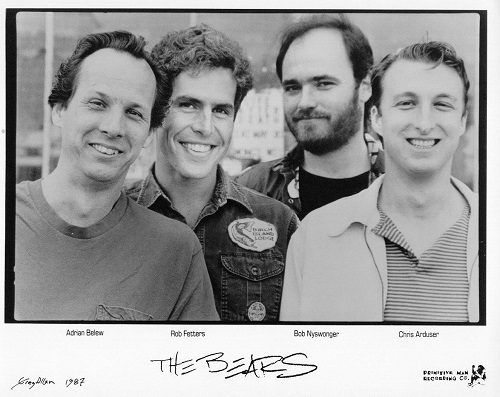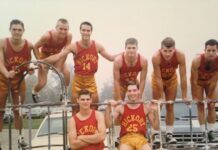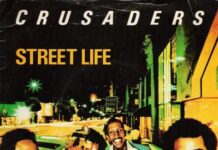Photo above courtesy of Rob Fetters
Take a second and think about some of the music legends you admire. Chances are, you could easily play a game called “Six Degrees of Adrian Belew.”
Frank Zappa? Yep, there’s Belew playing and singing in his band during the brilliant Sheik Yerbouti period. David Bowie? Yep, that’s his distinctive guitar work turning Lodger into an artistic classic for the ages. How about the Talking Heads? Yep — just watch live footage of the band in the early 1980s and you’ll likely see Belew in bright colors, smirking and moving about, adding groove to underrated tracks like “The Great Curve.”
Then, of course, there’s his three-album 1980s output with King Crimson. Coated in bubblegum pink with slicked back hair and a voice that seemingly sounds like what the cover of In the Court Of The Crimson King looks like, Belew helped turn Crimson into a tight four-piece, translating influences of New York streets, Paul Bowles, Jack Kerouac, and harrowing themes like sleepless nights into more mainstream progressive gems. It would be Belew’s noted “City Of Tiny Lites” wail and elephant trunk blast guitar work that would establish him as one of music’s great innovators.
Yet once Crimson folded for arguably the umpteenth time, Belew did something truly unique — he dove headfirst into alternative pop music, forming a collective called The Bears. Combining Belew with the members of a Cincinnati, Ohio power-pop outfit called The Raisins, the group would go on to record four studio albums and build a fervent cult following through dedicated live touring. Sharing the same manager (Stan Hertzman), Belew joined together with band members Rob Fetters (vocals/guitar) and Bob Nyswonger (bass) after the Raisins — despite a hit regional song called “Fear Is Never Boring” — were unable to find sustained success nationwide and broke up.
For Belew, it was an opportunity to create “my version of the Beatles.”
“Man, I just loved that band. I saw them every chance I got. In fact, a lot of people saw them — Todd Rundgren saw them; Frank Zappa saw them once and said they were the greatest unknown garage band in the world,” Belew told me recently. “That was the rub on the Raisins — everybody loved them and thought they should be huge but nobody in the music business took notice.”
“The day I quit…I called Adrian and I said, ‘I quit’ and Adrian said, ‘Well that sounds good to me, let’s start a band,’” Fetters said.
“Adrian was conceptualizing. He really wanted to think about what he wanted to do because he had done a lot of sideman gigs. He had done the Talking Heads and he was a key part of King Crimson. I think there was a desire on his part to do his own band,” added Nyswonger. “He wanted to have a world-class pop band. That was what the idea was.”
While Belew’s known status would seemingly elevate him to position of Bears frontman, he makes it clear he didn’t want to be the group’s only person out front, especially after serving the role for King Crimson over three world tours.
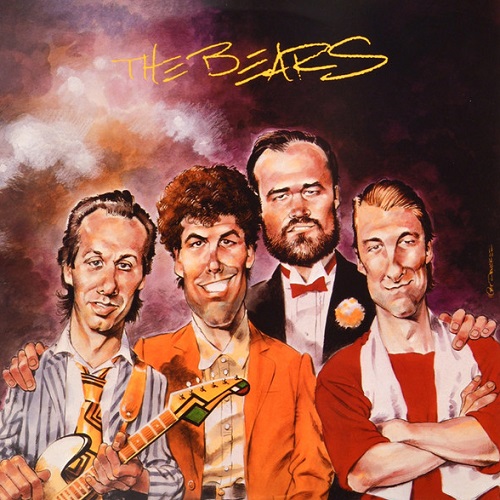
“I really wanted to have harmony and I really wanted to have a partner — a guitar partner — who could jump around and be as frantic as I was being. Overall, I really wanted it to feel and act and behave like a band,” he said. “The final thing that I thought was a real selling point was when you’re in a band of people who love each other and know each other really well and have their backgrounds and their character all the same, I think it’s a real special thing. So many bands are put together from different elements and that can work too but it never quite has that special sauce that you get from playing with people you know and love.”
Ultimately incorporating Raisins drummer Chris Arduser, the group set about to create something wholly unique. Instead of lengthy, instrumental epics, they churned out polished, three-minute gems. They also created a look immortalized on their 1987 eponymous debut album for IRS subsidiary Primitive Man by Mad Magazine cartoonist Mort Drucker. Even their band name was intentionally designed to reflect a team unit. Belew’s initial choice was The Tigers but he was ultimately outvoted.
“For the first Bears record, we were so well rehearsed, we had been writing and writing and rehearsing and rehearsing waiting for a record label to offer us money for well over a year,” Belew told me. “By the time we did the first record we knew exactly what it was supposed to be. There was no experimentation going on. It was just a matter of OK let’s go in the studio and do this on the budget we have which was small enough that we had to be quick.”
On The Bears, the quartet keep things simple musically but show off their cohesiveness as Belew and Fetters mutually share vocal duties on peppy songs like “Superboy” and “None of the Above,” among the first tracks the duo would pen together. The group has a sound tailor made for college radio, one that can be heard in other contemporaries of the time like Game Theory and Cleveland’s Pere Ubu. It would ultimately be this type of format — especially in Ohio — that set the Bears off and running as a viable musical act, one with a tagline of “East Meets Midwest.”
“We wrote a bunch of songs and took them apart and put them back together and destroyed them, and put them back together before we even recorded,” Fetters said.
“We were very precise with what we wanted to do, and we cut out anything that didn’t need to be there,” Belew said. “We wanted to fashion 10 pop songs.”
According to Nyswonger, Belew was never a “heavy-handed leader kind of guy. He definitely had an idea of what he wanted the band to be but we all had input and everybody had to be happy with everything. We were all of course Beatles fans, that’s where we came up. And we kind of decided that our favorite departure point was the Revolver album. We kind of tried to imagine music if they would have kept going in that direction.”
For the Bears, the goal was to accomplish something the Beatles never did in their later years — be able to actually play their innovative tracks live before an audience even with such innovative instruments at their disposal like guitar synthesizers replicating Indian sounds worthy of George Harrison’s later output with the group.
“It was important to us that we could play these songs live. We didn’t want to do anything that could only be done in the studio,” Fetters said. “When we got on the stage, we just wanted to rock out to everything. That necessarily put some limitation on production and arrangements.”
“I remember haggling over every line in some songs — just microscope them and make them sing right,” Nyswonger recalled. “If you go through one screen, that’s one screen but if it goes through four screens, we get a very fine powder after that.”
Here’s a basic breakdown of the album. “None of the Above” is a strong opener and boasts trademark Belew guitar intonations. “Fear Is Never Boring” carries over from the Raisin days but gets a reboot replete with a driving bass beat. The music overall is upbeat and lacks the mood of Belew’s more atmospheric efforts with one potential exception being the song “Raining.” “Man Behind The Curtain” contains a trippy Beatles-esque vibe that seemingly influences XTC’s Oranges and Lemons album of 1989. The Bears also has a fair amount of danceability to it, especially on tracks like “Honeybee” and “Meet Me In The Dark.”
Unfortunately, of late the Bears has remained more a sporadic entity than an enduring group given Belew’s solo work and other band member projects. To date, Belew has released 17 solo studio albums. That’s four more than King Crimson’s collective studio efforts over 50 years. Still, Belew told me he has two goal projects for the group — either having members assemble in his studio in Tennessee over several weekends to create a new album, or commandeering a hotel in the Cincinnati area for a Bears New Years Ever show.
“The Bears have been project-based as befitting the times we live in. Every time we see each other, we love each other. There aren’t any bad vibes in the band. We didn’t break up for artistic differences or anything like that,” Fetters told me. “We broke up because we couldn’t survive financially with the Bears as a full-time gig. There has been talk around trying to play some dates in a small geographic area. It gets talked about every time we’re together.”
I hope either project comes to fruition post-pandemic, especially given Fetters’ immediate next assessment about the group: “It’s the best live band ever. It’s just a really good combination of four musicians who love each other and love the music we’re playing.”
For Belew, the Bears remain among his top four professional accomplishments he still holds deep nostalgia for — right alongside his work with Bowie, the Talking Heads and King Crimson.
“The Bears is probably the least known of those four entities,” he said. “Yet they meant just as much to me, if not more, than any of the other things.”
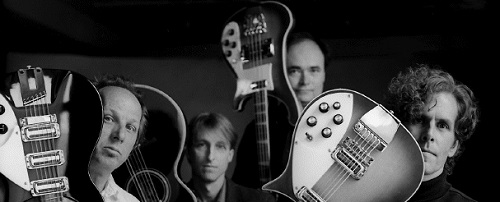
***
Share your feedback and suggestions for future columns with Ira at vinylconfessions84@gmail.com.


